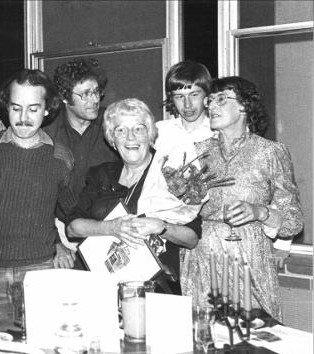When you google Di Riddell, the top links are to a life coach. ‘Di Riddell brings out the best in people,’ her website reads. For the new ANU Student Centre in Kambri, this seems like a wonderfully aspirational namesake. But the first Di Riddell has no links to ANU. Dig a little deeper, and a second Di Riddell appears.
Di Riddell, born Diana Gould, moved to Australia in the early 1960s, in the midst of the Cuban Missile Crisis. A friend’s request that she fill in a week-long vacancy at the ANU Student Association led to a 30 year career at ANU. At the time she joined the Association, it was the only association with a leader elected democratically.
During her time, she placed herself at the centre of a David and Goliath struggle for student representation at ANU Council. In doing so, she became an important advocate for students.
She facilitated campaigns for health services at ANU, particularly during drug crises. She also took a stand against the lack of condoms in Canberra. In 1972, she organised a condom vending machine to be brought from a brothel in Sydney, to enable safe sexual practices for students. In a 1977 edition of Woroni, one student publicly thanked Di for helping him find emergency housing.
She became known for averting crises, organising food and beds for activists and negotiating with the police. She established strong relationships with ACT officials while bailing out mass arrested students.
“When a student demonstration was pending,” Detective Sergeant Ron Dillon told The Canberra Times in 1995, “I knew Di would be putting aside the Bail Money.”
Di Riddell’s administrative tasks ultimately spread across almost all social and political campaigns of the late 20th century. She was at the heart of ANU’s campaigns for women’s rights, against Vietnam War conscription, and even the Aboriginal Tent Embassy. She organised blankets for fasting East Pakistan protesters in Canberra in the 1970s, and facilitated boycotting of the Springboks.
In 1990, the Student Association was dissolved, and Di moved to the ANU Arts Centre. The Arts Revue was what drew Di to the Student Association at first instance in the 1960s. As time went on, her interest in the Arts increased, and led to her eventual nineties move.
The lessening of student activism in these years was clearly another motivator for Di’s move. Speaking to The Canberra Times in the 1990s, she said “They couldn’t sustain their rage… They’re only interested in themselves.”
Today, essential places of community engagement and grassroots activism are indebted to Di Riddell for their institution at the ANU and in Canberra. The Drill Hall Gallery, the Food Co-op and Radio Station 2XX all have links to Di’s tenure.
The ANU Naming Committee’s choice to have the Student Centre adorned with Di’s name pays homage to the strong role ANU has historically played in activism and political engagement throughout Australia. Her influence has continuing significance for activists on campus today.
The Di Riddell Student Centre is home to Admissions, Access & Inclusion, Overseas Student Health Cover, ANUSA, PARSA, Student Experience & Career Development, Global Programs, and Woroni.
We acknowledge the Ngunnawal and Ngambri people, who are the Traditional Custodians of the land on which Woroni, Woroni Radio and Woroni TV are created, edited, published, printed and distributed. We pay our respects to Elders past and present. We acknowledge that the name Woroni was taken from the Wadi Wadi Nation without permission, and we are striving to do better for future reconciliation.
